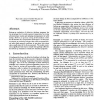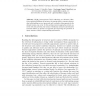26354 search results - page 149 / 5271 » How we refactor, and how we know it |
VLDB
1990
ACM
14 years 2 months ago
1990
ACM
Bottom-up evaluation of deductive database programs has the advantage that it avoids repeated computation by storing all intermediate results and replacing recomputation by table ...
CRYPTO
2007
Springer
14 years 2 months ago
2007
Springer
Oblivious transfer (OT) is an essential building block for secure multiparty computation when there is no honest majority. In this setting, current protocols for n 3 parties requ...
FQAS
2006
Springer
14 years 2 months ago
2006
Springer
Abstract. Highly heterogeneous XML collections are thematic collections exploiting different structures: the parent-child or ancestor-descendant relationships are not preserved and...
DAGSTUHL
2003
13 years 11 months ago
2003
Abstract. This study is intended to deal with the interdependency between control and body systems, and to discuss the “relationship as it should be” between these two systems....
IJCAI
2003
13 years 11 months ago
2003
We present an algorithm Pref-AC that limits arc consistency (AC) to the preferred choices of a tree search procedure and that makes constraint solving more efficient without chan...


